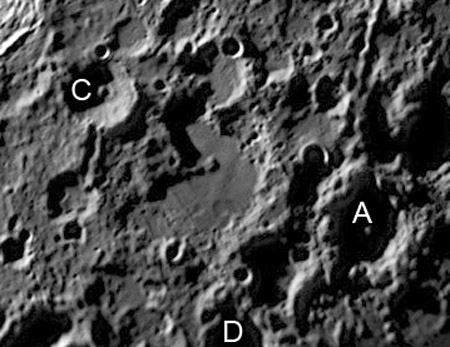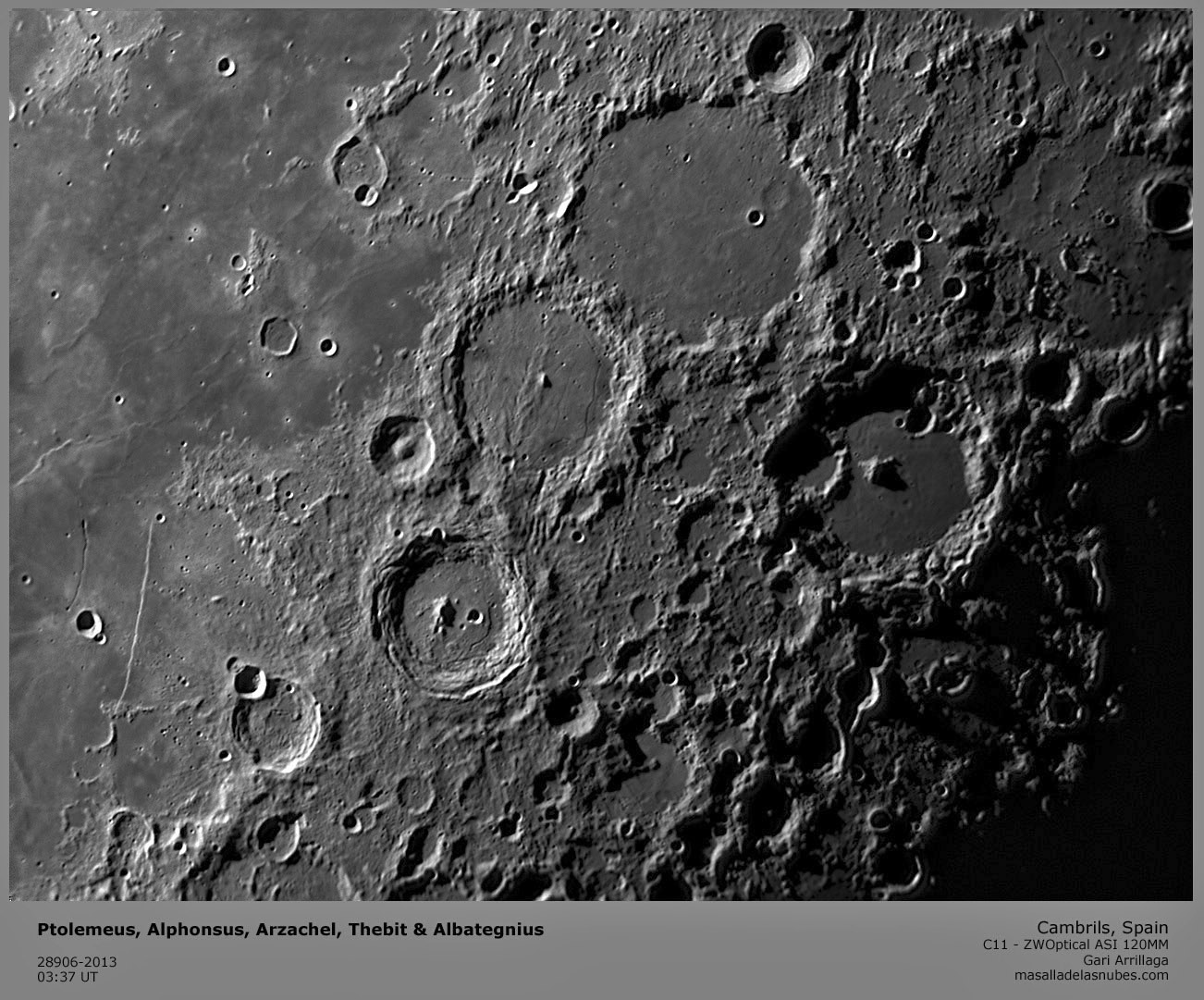Difference between revisions of "July 1, 2013"
(Created page with "__NOTOC__ =Swirled Pie= <!-- ws:start:WikiTextHeadingRule:0:<h1> --> <!-- ws:start:WikiTextLocalImageRule:14:<img src="/file/view/LPOD-Jul1-13.jpg/440084304/...") |
|||
| Line 7: | Line 7: | ||
<br /> | <br /> | ||
| + | <table class="wiki_table"> | ||
| + | <tr> | ||
| + | <td><!-- ws:start:WikiTextLocalImageRule:15:<img src="/file/view/LPOD-Jul1-13b.jpg/440086550/LPOD-Jul1-13b.jpg" alt="" title="" /> -->[[File:LPOD-Jul1-13b.jpg|LPOD-Jul1-13b.jpg]]<!-- ws:end:WikiTextLocalImageRule:15 --><br /> | ||
</td> | </td> | ||
<td>This is a fascinating area with layers upon layers of history. Some of the most conspicuous and best known layers resulted from the Imbrium Basin impact event, which spread pulverized rock across the region. Some of the ejecta fills the floors of Ptolemaeus, Albategnius and perhaps other relatively smooth areas, making ghostly saucers by draping pits from earlier arriving debris. Other pieces of ejecta made narrow lines of closely spaced secondaries or perhaps even gouges called Imbrium sculpture. Here I want to focus on less well known details near the bottom center of Gari's image. A strange circular area of smooth plains with a pie slice of roughness on the west is placed between the craters Airy (A), Donati (D) and Parrot C (C). Whether this flat area fills one ancient crater, or two or three overlapping smaller ones isn't known, but the floor contains three features of interest. First are three or more lines that extend between C and D. These look like radial secondary craters from Parrot C, but perhaps they come from the younger Arzachel that is beyond C in the direction of the linears. The second features of interest are three nearly rimless depressions at the bottom of the broad smooth-floored crater. None of these features show up well in the higher Sun LRO QuickMap [http://target.lroc.asu.edu/q3/?proj=eqc&center=-575602.109292,76108.785937&zoom=7&lt=LocationOverlays=llgrid,F,70;moonsunlit,F,40;satview,F,;lroc_feat_images,F,;moon_ft,T,;=InstrumentFootprints=m3_fprints,F,50;nac_fprints,F,100;=SpecialProducts=lndtmcs,F,100;lndtms,F,100;lnpole,F,100;l_lro_mrf,F,100;l_ch1_mrf,F,100;lpjnac,F,100;=M3GlobalMosaics=m3_mosaic_op2c3,F,100;m3_mosaic_op2c2,F,100;m3_mosaic_op2c1,F,100;m3_mosaic_op2b,F,100;m3_mosaic_op2a,F,100;m3_mosaic_op1b,F,100;m3_mosaic_op1a,F,100;=M3SphModelGlobalMosaics=m3_mosaic_sph_op2c3,F,100;m3_mosaic_sph_op2c2,F,100;m3_mosaic_sph_op2c1,F,100;m3_mosaic_sph_op2b,F,100;m3_mosaic_sph_op2a,F,100;m3_mosaic_sph_op1b,F,100;m3_mosaic_sph_op1a,F,100;=Basemaps=lclem_mr,F,100;wac_demclrshd2_128ppd,F,30;lnbrowse,F,100;wac_bw_v1_par,F,100;wac_bw_v1_plus_nacs,T,100;= mosaic.] Are these saucers that are covered with much subsequent ejecta? A third feature, just barely visible, is a roughly north-south line of subtle depressions/mottled brightness. This may extend from the three bright craters on the edge of the pied-crater. This is the area of a dark lane in the [http://lpod.wikispaces.com/February+10,+2008 Airy swirl]. Finally, although not visible here, Airy is a rare floor-fractured highland crater - see the LRO mosaic link above. <br /> | <td>This is a fascinating area with layers upon layers of history. Some of the most conspicuous and best known layers resulted from the Imbrium Basin impact event, which spread pulverized rock across the region. Some of the ejecta fills the floors of Ptolemaeus, Albategnius and perhaps other relatively smooth areas, making ghostly saucers by draping pits from earlier arriving debris. Other pieces of ejecta made narrow lines of closely spaced secondaries or perhaps even gouges called Imbrium sculpture. Here I want to focus on less well known details near the bottom center of Gari's image. A strange circular area of smooth plains with a pie slice of roughness on the west is placed between the craters Airy (A), Donati (D) and Parrot C (C). Whether this flat area fills one ancient crater, or two or three overlapping smaller ones isn't known, but the floor contains three features of interest. First are three or more lines that extend between C and D. These look like radial secondary craters from Parrot C, but perhaps they come from the younger Arzachel that is beyond C in the direction of the linears. The second features of interest are three nearly rimless depressions at the bottom of the broad smooth-floored crater. None of these features show up well in the higher Sun LRO QuickMap [http://target.lroc.asu.edu/q3/?proj=eqc&center=-575602.109292,76108.785937&zoom=7&lt=LocationOverlays=llgrid,F,70;moonsunlit,F,40;satview,F,;lroc_feat_images,F,;moon_ft,T,;=InstrumentFootprints=m3_fprints,F,50;nac_fprints,F,100;=SpecialProducts=lndtmcs,F,100;lndtms,F,100;lnpole,F,100;l_lro_mrf,F,100;l_ch1_mrf,F,100;lpjnac,F,100;=M3GlobalMosaics=m3_mosaic_op2c3,F,100;m3_mosaic_op2c2,F,100;m3_mosaic_op2c1,F,100;m3_mosaic_op2b,F,100;m3_mosaic_op2a,F,100;m3_mosaic_op1b,F,100;m3_mosaic_op1a,F,100;=M3SphModelGlobalMosaics=m3_mosaic_sph_op2c3,F,100;m3_mosaic_sph_op2c2,F,100;m3_mosaic_sph_op2c1,F,100;m3_mosaic_sph_op2b,F,100;m3_mosaic_sph_op2a,F,100;m3_mosaic_sph_op1b,F,100;m3_mosaic_sph_op1a,F,100;=Basemaps=lclem_mr,F,100;wac_demclrshd2_128ppd,F,30;lnbrowse,F,100;wac_bw_v1_par,F,100;wac_bw_v1_plus_nacs,T,100;= mosaic.] Are these saucers that are covered with much subsequent ejecta? A third feature, just barely visible, is a roughly north-south line of subtle depressions/mottled brightness. This may extend from the three bright craters on the edge of the pied-crater. This is the area of a dark lane in the [http://lpod.wikispaces.com/February+10,+2008 Airy swirl]. Finally, although not visible here, Airy is a rare floor-fractured highland crater - see the LRO mosaic link above. <br /> | ||
Revision as of 21:29, 1 January 2015
Swirled Pie
image by Gari Arrillaga
 |
This is a fascinating area with layers upon layers of history. Some of the most conspicuous and best known layers resulted from the Imbrium Basin impact event, which spread pulverized rock across the region. Some of the ejecta fills the floors of Ptolemaeus, Albategnius and perhaps other relatively smooth areas, making ghostly saucers by draping pits from earlier arriving debris. Other pieces of ejecta made narrow lines of closely spaced secondaries or perhaps even gouges called Imbrium sculpture. Here I want to focus on less well known details near the bottom center of Gari's image. A strange circular area of smooth plains with a pie slice of roughness on the west is placed between the craters Airy (A), Donati (D) and Parrot C (C). Whether this flat area fills one ancient crater, or two or three overlapping smaller ones isn't known, but the floor contains three features of interest. First are three or more lines that extend between C and D. These look like radial secondary craters from Parrot C, but perhaps they come from the younger Arzachel that is beyond C in the direction of the linears. The second features of interest are three nearly rimless depressions at the bottom of the broad smooth-floored crater. None of these features show up well in the higher Sun LRO QuickMap mosaic. Are these saucers that are covered with much subsequent ejecta? A third feature, just barely visible, is a roughly north-south line of subtle depressions/mottled brightness. This may extend from the three bright craters on the edge of the pied-crater. This is the area of a dark lane in the Airy swirl. Finally, although not visible here, Airy is a rare floor-fractured highland crater - see the LRO mosaic link above.
|
COMMENTS?
Click on this icon File:PostIcon.jpg at the upper right to post a comment.




